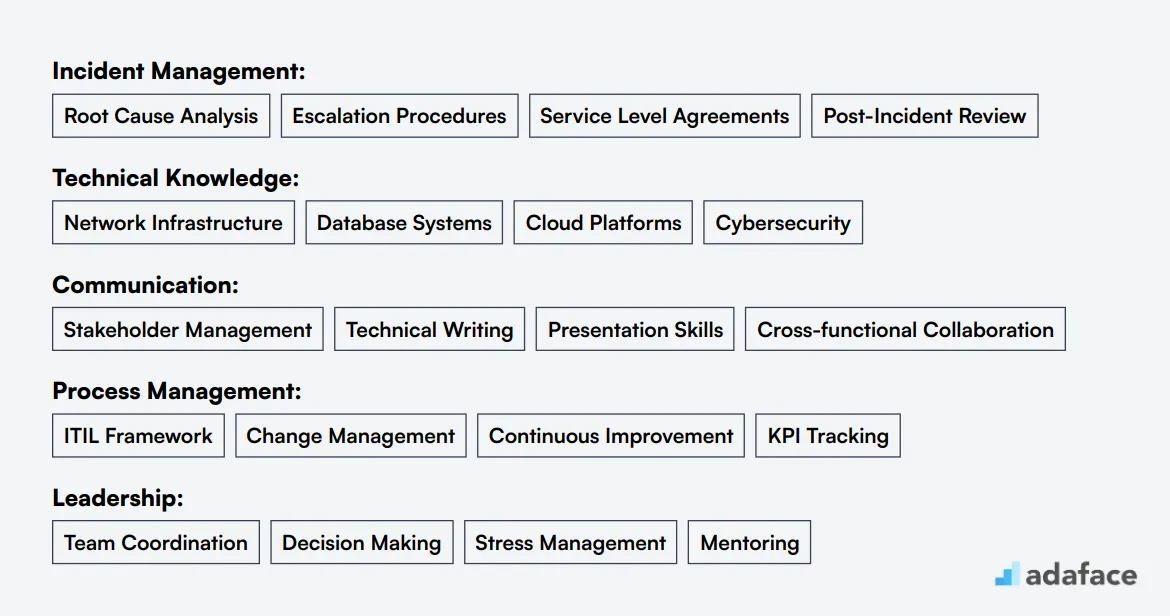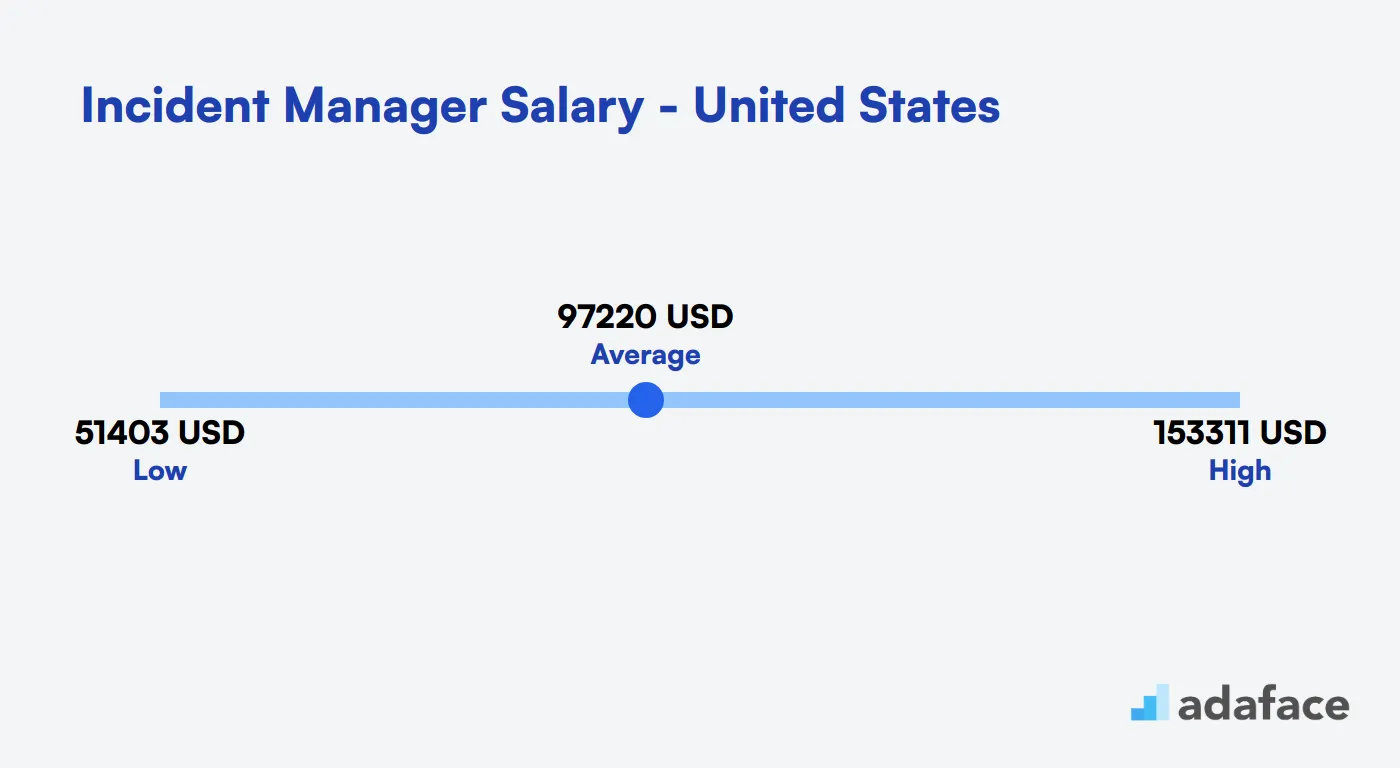Hiring an Incident Manager is a critical task for companies aiming to maintain operational stability and minimize downtime. Many organizations underestimate the importance of this role, often conflating it with general IT management. However, an Incident Manager's specialized skills in crisis response, communication, and problem-solving are key to effectively handling and resolving unexpected issues that can impact business continuity.
This comprehensive guide will walk you through the process of hiring an Incident Manager, from understanding the role to conducting effective interviews. We'll cover the essential skills required for an Incident Manager and provide actionable insights to help you find the right candidate for your organization.
Table of contents
Incident Manager Hiring Process
The hiring process for an Incident Manager typically takes around 4-6 weeks. Here's a quick overview:
- Define the role and create a detailed job description.
- Post the job opening on relevant job boards and career sites.
- Screen resumes and conduct initial phone interviews.
- Administer technical assessments and case studies to evaluate problem-solving and critical thinking abilities.
- Conduct in-person interviews with the top candidates, involving behavioral and situational questions.
- Perform background checks and reference checks on the final candidates.
- Extend an offer to the most suitable candidate.
While the timeline may vary, this structured approach helps identify the best fit for the Incident Manager role. Let's dive deeper into each step of the process.
Key Skills and Qualifications for an Incident Manager
When hiring an Incident Manager, crafting an accurate candidate profile is essential. Many recruiters struggle with distinguishing between must-have and nice-to-have qualifications, which can lead to misalignment with the role's requirements. It's important to clearly delineate between what is required and what is preferred for your organization.
Here are the commonly sought skills and qualifications for an Incident Manager:
- Required Skills:
- Bachelor's degree in IT, Computer Science, or related field
- 5+ years of experience in IT incident management
- ITIL certification
- Strong problem-solving and analytical skills
- Excellent communication and leadership abilities
- Preferred Skills:
- Master's degree in IT Management or related field
- Experience with major incident management tools (e.g., ServiceNow, JIRA)
- Knowledge of cloud computing platforms (AWS, Azure, GCP)
- Six Sigma or PMP certification
- Experience in a large enterprise environment
| Required skills and qualifications | Preferred skills and qualifications |
|---|---|
| Bachelor's degree in IT, Computer Science, or related field | Master's degree in IT Management or related field |
| 5+ years of experience in IT incident management | Experience with major incident management tools (e.g., ServiceNow, JIRA) |
| ITIL certification | Knowledge of cloud computing platforms (AWS, Azure, GCP) |
| Strong problem-solving and analytical skills | Six Sigma or PMP certification |
| Excellent communication and leadership abilities | Experience in a large enterprise environment |
10 platforms to hire Incident Managers
Now that you have a well-defined job description, it's time to list the position on various job platforms to attract the right candidates. Utilizing job listing sites allows you to tap into a broader talent pool and effectively source Incident Managers who are well-suited for your organization.
LinkedIn Jobs
Ideal for posting full-time Incident Manager positions. Offers wide reach and detailed job descriptions, allowing recruiters to target professionals with relevant experience.

Indeed
Versatile platform suitable for posting full-time, part-time, and contract Incident Manager roles. Provides a large candidate pool and easy application process.

Dice
Specialized in tech roles, perfect for finding Incident Managers with strong IT backgrounds. Offers targeted reach to tech professionals.

Start with platforms like LinkedIn Jobs, which is perfect for full-time positions, and Indeed, a versatile site for all types of roles. Additionally, consider Dice, a tech-focused site ideal for reaching candidates with strong IT backgrounds. For the remaining platforms, they offer unique advantages such as employer branding, freelance opportunities, and niche focus, thus catering to different recruitment needs.
How to Screen Incident Manager Resumes?
Screening resumes is the first step in narrowing down the potential candidates for an Incident Manager role. Given the numerous applications, it's essential to quickly identify those who meet the primary qualifications and have the necessary experience and skills. This ensures a focused and productive hiring process, saving time and resources for more detailed evaluations.

When manually screening resumes, look for specific keywords and phrases that align with the job requirements. These include educational qualifications like a 'Bachelor's degree in IT', certifications such as 'ITIL', and experience in 'incident management'. Moreover, skills like 'problem-solving', 'analytical skills', and 'communication abilities' are essential. By focusing on these terms, you can efficiently filter out candidates who may not fit the criteria.
Incorporating AI tools can further streamline the resume screening process. With tools like ChatGPT or Claude, you can input the desired keywords and receive an automated shortlist of candidates whose resumes match your criteria. This approach not only speeds up the process but also minimizes human error, ensuring you don't overlook potential fits.
Here is a sample AI prompt you can use to screen resumes for an Incident Manager role:
TASK: Screen resumes to match job description for Incident Manager role
INPUT: Resumes
OUTPUT: For each resume, provide following information:
- Email id
- Name
- Matching keywords
- Score (out of 10 based on keywords matched)
- Recommendation (detailed recommendation of whether to shortlist this candidate or not)
- Shortlist (Yes, No or Maybe)
RULES:
- If you are unsure about a candidate's fit, put the candidate as Maybe instead of No
- Keep recommendation crisp and to the point.
KEYWORDS DATA:
- Bachelor's degree in IT, ITIL certification, IT incident management
- Problem-solving, Analytical skills, Communication
- ServiceNow, JIRA, Cloud Platforms
Recommended Skills Tests for Assessing Incident Managers
Skills tests are a great way to evaluate Incident Manager candidates objectively. They help you assess technical knowledge and soft skills needed for the role. Let's look at some key tests to include in your hiring process.
Project Management Test: This project management assessment evaluates a candidate's ability to plan, execute, and monitor projects. It's important for Incident Managers who need to coordinate responses and manage resources during incidents.
Problem Solving Test: Incident Managers often face complex issues that require quick thinking. A problem-solving test helps gauge a candidate's ability to analyze situations and develop effective solutions under pressure.
Communication Test: Clear communication is key during incidents. Use a communication skills test to assess how well candidates can convey information to various stakeholders, from technical teams to management.
IT Knowledge Test: A solid understanding of IT systems is necessary for Incident Managers. An IT test can help verify a candidate's technical knowledge relevant to identifying and resolving IT-related incidents.
Situational Judgment Test: This test presents real-world scenarios to evaluate decision-making skills. A situational judgment assessment is valuable for predicting how candidates might handle various incident scenarios they'll encounter on the job.
How to structure the interview stage for hiring Incident Managers
Candidates who pass the initial skills tests should be invited to technical interviews to assess their hard skills. This step is important because while skills tests help filter out unfit candidates, they may not always identify the best fit for the role. During the interview, employers can explore candidates' specific knowledge and approach to incident management.
Consider asking candidates the following questions to understand their suitability for the role of Incident Manager: 1) How do you prioritize incidents during a major outage? This evaluates their decision-making capabilities under pressure. 2) Can you describe a challenging incident you managed in the past and how you resolved it? This helps gauge their problem-solving skills. 3) How do you communicate with stakeholders during an incident? Effective communication is key, and you can explore more on communication interview questions. 4) How do you ensure incidents are documented and analyzed post-resolution? This assesses their attention to detail and commitment to continuous improvement. 5) What strategies do you use to ensure incidents are prevented in the future? This gives insight into their proactive planning abilities.
Understanding the Cost of Hiring an Incident Manager
The cost of hiring an Incident Manager can vary significantly based on the candidate's experience and location. In the United States, for instance, the average salary is approximately $97,220, with a range from $51,404 to $153,312. This means that hiring an Incident Manager can be a significant investment, but understanding the salary benchmarks can help you attract the right talent.
Incident Manager Salary in the United States
The average salary for an Incident Manager in the United States is $97,220. Depending on the location and experience, salaries can range from as low as $51,404 to as high as $153,312. For instance, Incident Managers in Washington, DC, might expect higher salaries, with a median around $132,885, while those in Cary, NC, see median figures closer to $49,258.

Incident Manager Salary United Kingdom
The average salary for an Incident Manager in the United Kingdom can range significantly based on experience and location. Salaries typically start at around £30,000 per year for entry-level positions and can go up to £65,000 for those with more experience or in senior roles. On average, the median salary falls around £45,000. It's important for recruiters to benchmark these figures against their budget and the specific demands of their organization.

Incident Manager Salary in Australia
The average salary for an Incident Manager in Australia varies significantly across different states. Generally, it ranges from $76,569 to $168,596, with the median salary being around $113,619. For example, in Canberra, salaries can reach a high of $169,113, while in Darwin, they start at approximately $78,466.

What's the difference between an Incident Manager and a Problem Manager?
People often mix up the roles of Incident Managers and Problem Managers, thinking they do the same things. However, their responsibilities and focuses are quite distinct. Both are critical in IT service management, but they tackle different parts of the process.
An Incident Manager is like a firefighter, immediately jumping into action to resolve disruptions and restore services. They are focused on quick resolutions, handling triage, and ensuring escalations are processed in real-time to meet Service Level Agreements (SLAs). Their primary skills include crisis management and excellent communication as they coordinate with cross-functional teams using specialized Incident Management Systems.
On the other hand, a Problem Manager is more like a detective, digging deeper to identify the root cause of issues to prevent them from happening again. They engage in thorough investigation and documentation, predominantly interacting with technical teams. Their key metrics revolve around reducing problem recurrence and completing root cause analyses, working with Problem Management Tools.
| Incident Manager | Problem Manager | |
|---|---|---|
| Primary Focus | Immediate resolution | Root cause analysis |
| Typical Activities | Triage, Escalation, Coordination | Investigation, Analysis, Documentation |
| Response Time | Real-time or very urgent | Scheduled or follow-up |
| Key Metrics | Resolution Time, SLA Adherence | Problem Recurrence, RCA Completion |
| Stakeholder Interaction | High, cross-functional teams | Moderate, technical teams |
| Required Skills | Crisis Management, Communication | Analytical, Documentation |
| Tools Used | Incident Management Systems | Problem Management Tools |
| End Goal | Service restoration | Prevent future incidents |
Hire the Right Incident Managers for Your Needs
Throughout this blog post, we have explored the intricacies of hiring an Incident Manager, focusing on understanding the hiring process, identifying key skills, and utilizing effective screening techniques. We've discussed how to navigate resumes, assess relevant qualifications, and structure interviews to find the right fit for your team.
The key takeaway for ensuring a successful hire is to craft precise job descriptions and utilize skills assessments tailored to the role. By integrating situational judgement tests and project management tests into your process, you can more accurately gauge a candidate's suitability. These tools aid in filtering candidates who not only possess the necessary technical skills but also the problem-solving abilities critical to the role.
Project Management Test
FAQs
Key skills for an Incident Manager include strong problem-solving abilities, excellent communication skills, leadership qualities, knowledge of ITIL frameworks, ability to work under pressure, and experience with incident management tools and processes.
You can assess incident management skills through situational judgment tests, technical assessments, role-playing exercises, and behavioral interview questions that focus on past experiences handling incidents.
Valuable certifications for Incident Managers include ITIL Foundation, Certified Information Systems Security Professional (CISSP), Certified Information Security Manager (CISM), and Project Management Professional (PMP).
Structure the interview to include technical questions, scenario-based questions, behavioral questions, and a discussion of the candidate's experience with incident management tools and methodologies. Consider including a practical exercise to assess their problem-solving skills in real-time.
To attract top talent, highlight opportunities for professional growth, emphasize the importance of the role in the organization, offer competitive compensation, and showcase your company's commitment to technology and innovation. You can also leverage remote hiring strategies to access a wider talent pool.
The hiring process for an Incident Manager typically takes 4-6 weeks, including initial screening, assessments, interviews, and reference checks. However, this can vary depending on the urgency of the role and the availability of qualified candidates.
Red flags may include a lack of specific incident management experience, poor communication skills, inability to provide concrete examples of past incident resolutions, lack of knowledge about current incident management tools and methodologies, or difficulty in explaining complex technical concepts in simple terms.

40 min skill tests.
No trick questions.
Accurate shortlisting.
We make it easy for you to find the best candidates in your pipeline with a 40 min skills test.
Try for freeRelated posts
Free resources



